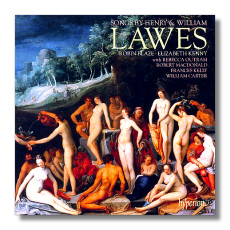
The Internet's Premier Classical Music Source
Related Links
- Latest Reviews
- More Reviews
-
By Composer
-
Collections
DVD & Blu-ray
Books
Concert Reviews
Articles/Interviews
Software
Audio
Search Amazon
Recommended Links
Site News
 CD Review
CD Review
Early English Song

- Henry Lawes:
- A Tale out of Anacreon
- Oh, that joy so soon should waste
- Sweet, stay awhile
- Why do you rise?
- Amarillis, by a spring
- From the heav'ns now I fly
- Sweet Echo, sweetest nymph that liv'st unseen
- Oh sweet woods, the delight of solitariness
- Tavola: In quel gelato core una voce
- Loves Sweet Repose: Amidst the myrtles as I walk
- No Reprieve: Now, now Lucasia, now make haste
- Slide soft, you silver floods
- When shall I see my captive heart?
- A Pastoral Élégie: Cease you jolly shepherds
- The Angler's Song: Man's life is but vain, for 'tis subject to pain
- William Lawes:
- Gather your rosebuds while you may
- Oh, let me still and silent lie
- Oh, my Clarissa, thou cruel fair
- Corant from The Royall Consort
- Country Dance
- Alman for 2 Lutes
- Corant for 2 Lutes
- A Dreame: I laid me down upon a pillow soft
- Corant for 2 Lutes
- When man for sin thy judgment feels
- René Saman: Monsieur Saman his Coranto
- Cuthbert Hely:
- Fantasia
- Saraband
Robin Blaze, counter-tenor
Rebecca Outram, soprano
Robert Macdonald, bass
Elizabeth Kenny, lute
William Carter, lute & guitar
Frances Kelly, double harp
Hyperion CDA67589 73m DDD
The brothers Henry and William Lawes shone at a time when English music was otherwise at something of a low ebb, the final handful of the last generation of madrigalists (Morley d. 1602, Byrd and Weelkes d. 1623 and Gibbons, d. 1625) being either dead or silent. Even William Lawes (1602-1645) was silenced himself by a 'casual shot' at the massacre (he joined Charles I' Royalist army) of Rowton Heath in the Civil Wars. Henry (1596-1662), also a faithful royal servant at the Chapel Royal before and after the Commonwealth wrote, if anything, music of wider appeal and the greater profundity and accomplishment. His songs have a tenderness, poignancy and latent intensity verging at times on the romantic.
William Lawes' songs have suffered from being judged inferior to his instrumental output, because of an over-eagerness to pander to the literary fads (hence to set inferior texts) of his patrons. While European composers of the first half of the seventeenth century were indeed coming to terms with the relationship between text and voice, Milton was writing:
…with smooth Aire could humour best our tongue.
Thou honourest Verse, and Verse must lend her wing
To honour thee, the Priest of Phebus quire…
In other words, let not the music obscure or obstruct the words. On the other hand, many minor Caroline poets and writers of 'minor' masques were only too happy to have their work 'immortalized' by competent musicians. What's more, contemporaries truly admired the deft playing of William Lawes in particular.
The sequence of pieces presented on this attractive CD militates very much in favor of an enjoyable hour and a quarter (nearly): a typically generous selection from Hyperion. Quiet, meditative and reflective numbers like Oh let me still and silent lie are set in close contrast with lyrical ones like Oh, my Clarissa after more extrovert and upbeat works such as Amarillis, by a spring. The more you listen to all these unpretentious, genuine and melodious songs, the more you'll get to know their sheer inventiveness and memorability. They're a degree more ornate than Dowland, yet barer than Purcell. Very fetching whichever comparisons you chose to make.
Here is a disc, then, which should be listened to with an open mind: listened to for the sake of the melodic invention and accomplished sonic textures which Henry and William Lawes create in their different ways. Light, in the best sense – not dense. Uplifting – not because trite, but detached and positive. Emotively strong – because aware of melancholy and at the same time conscious of the purity of the medium of song as a way to have live performers communicating very live ideas and feelings.
These qualities are ones which Robin Blaze in particular excels; his diction, pitch, phrasing and sense of this very relationship, words with notes, are exemplary. Rebecca Outram and Robert MacDonald also sing with flair. Elizabeth Kenny's outstanding lute and theorbo playing is a marvel – suitable drama when it's needed; reticence when the singers obviously need that too. Frances Kelly (double harp) and William Carter (lute, guitar, theorbo) join in, variously, on half a dozen or so of the over two dozen items which make up what really is a very worthwhile CD, the combination of compositions of which cannot currently be found on any other CD in the catalog.
There is one short instrumental number by each of Renée Saman (fl.1610-1631) and Cuthbert Hely (fl.1620-1640), contemporaries of the Lawes. The CD is well-recorded with just the right amount of atmosphere and excellent, informative liner notes including the full texts of all the songs and detail about the writers. You should certainly buy this CD if you are fond of English music, the countertenor repertoire or musical developments in Britain at a time when so much of such immense importance was happening in mainland Europe. Indeed Lawes' music is illuminating in that it prefigures the songs and instrumental pieces of Purcell, and even Handel. But above all these are delicious, colorful, clear, persuasive and effecting songs in their own right. Warmly recommended.
Copyright © 2007, Mark Sealey




















